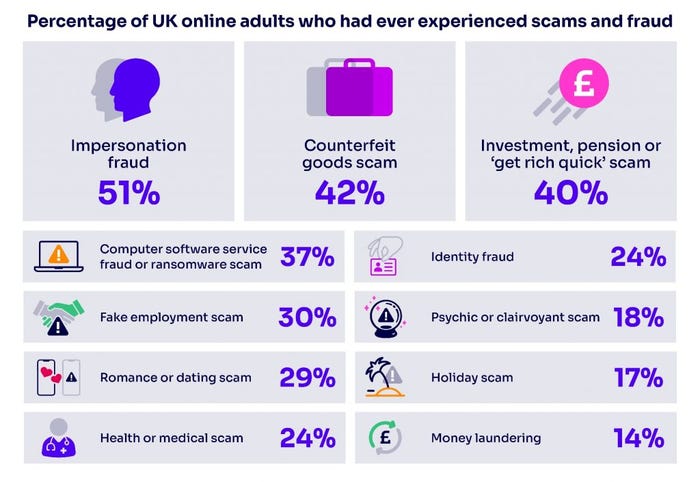Most Brits think it is up to tech firms to stop scamsMost Brits think it is up to tech firms to stop scams
UK telco watchdog Ofcom has published new research highlighting the scale of Internet scams, and whose job it is to tackle them.
March 16, 2023

UK telco watchdog Ofcom has published new research highlighting the scale of Internet scams, and whose job it is to tackle them.
87% of Internet users in the UK – that’s nearly 43 million adults – have encountered suspected online scams, according to Ofcom. Examples include messages from scammers impersonating their bank or a relative; fake dating apps or employment offers; counterfeit goods; and investment scams, among others.
These techniques appear to have a high success rate, with 46% of respondents admitting they had been personally drawn in by them, and 39% saying they knew someone who had. Furthermore, 25% of people who encountered scams suffered financial loss, with 21% of this particular group being duped out of £1,000 or more.
There is also a worrying degree of helplessness among victims of online scams, with 17 percent of respondents who experienced a potential scam or fraud not bothering to take any action at all. Of this group, 29 percent thought that reporting it wouldn’t make any difference, and another 29 percent didn’t know who to inform in the first place.
Opinions vary about whose job it should be to prevent scams in the first place, but 61% think it is up to online tech companies to tackle the problem. There is some logic here. In addition to fraudulent online content, scam calls are also a major issue. In this case, it is the platform providers – i.e. the phone companies – that are taking measures to address it. The UK government is also broadly in agreement. Its controversial Online Safety Bill aims to put the onus on social media companies to keep users safe by removing illegal content.
However, 54% of respondents in Ofcom’s research think it is a users’ own responsibility to not be duped by a scammer, while the same proportion also thinks the police should deal with it. Meanwhile, 30% think it should be Ofcom’s job.
On that note, the watchdog’s Website has a section providing the usual advice to help people avoid becoming a victim. It includes the old piece of wisdom that if an offer seems too good to be true, it probably is. It also reminds people not to give out personal information, and recommends people double check the identity of a person or organisation that has been in contact. Ofcom also advised people to not open email attachments from people they don’t know, use protected payment methods, and report suspicious activity.
“Falling victim to online fraud can have a devastating impact on people’s financial and mental well-being,” said Richard Wronka, Ofcom’s director of online safety policy, in a statement on Thursday. “The Online Safety Bill will place new obligations on online services to protect their users against online fraud and scams. Today’s report provides crucial evidence that will help to inform our approach to implementing those new laws when they arrive.”

Get the latest news straight to your inbox. Register for the Telecoms.com newsletter here.
About the Author
You May Also Like










.png?width=300&auto=webp&quality=80&disable=upscale)


_1.jpg?width=300&auto=webp&quality=80&disable=upscale)